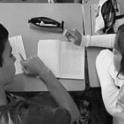We are celebrating the 10-year anniversary of Debats d’Educació by giving the educational community the opportunity to air its views

I am a professor of applied economics at the University of Barcelona, specialising in educational economics and welfare economics.
The three things I’ve learned
Good educational finance must leave no pupil behind
Educational finance must be designed with one essential aim: fairness. Not only must it ensure equal treatment (this would be a “modest” aim for fairness), it must go further and seek guaranteed egalitarian educational results. Systems based on comprehensiveness and inclusion are the best directed ones in this sense, according to international comparative studies.
Ensuring that no pupil is left behind is an aim implying the deployment of considerable financial resources aimed at supporting pupils with disadvantages in the most personalised way possible. However, it is a worthwhile investment, both in terms of accumulation of capital and for increasing social cohesion and reducing conflicts.
Good educational finance must be supported by good evaluation
Good educational finance must contain a series of properly evaluated projects and programmes. Prior evaluation is necessary, before programmes and projects are implemented, through simulations and, if appropriate, pilot applications. Once programmes and projects are being applied, their true impact must be evaluated. This impact evaluation, taking into account the cost of the action, makes it possible to take decisions concerning the future destination of financial resources.
Too often in educational finance we have seen resources devoted to programmes whose effectiveness (in terms of educational results, for example) has not been evaluated. This is very damaging, particularly at a time of tight budgets as are forecast for the next few years, as in this way it is not possible to prioritise highly effective actions.
Good educational finance must be based on the added value provided by schools and teaching staff
Over the last few years, the pressure concerned with the link between evaluation (of schools, of teachers) and finance has intensified. In the same way that the evaluation of schools, aimed at providing information to families to help them make choices, as appropriate, should take account of the starting point and the type of user of each school, evaluation aimed at providing financial incentives must take added value into account.
The diversity of starting points of different schools means that treating all of them the same when it comes to assigning incentives is unfair, both at school and teacher level. It is therefore advisable to introduce corrections allowing evaluation depending on the relative development of the school and depending on the contribution of teachers to that development.















 The texts published on this website are, unless otherwise indicated, covered by the Creative Commons Spain Attribution 3.0 licence. You may copy, distribute, transmit and adapt the work, provided you attribute it (authorship, journal name, publisher) in the manner specified by the author(s) or licensor(s). The full text of the licence can be consulted here:
The texts published on this website are, unless otherwise indicated, covered by the Creative Commons Spain Attribution 3.0 licence. You may copy, distribute, transmit and adapt the work, provided you attribute it (authorship, journal name, publisher) in the manner specified by the author(s) or licensor(s). The full text of the licence can be consulted here: